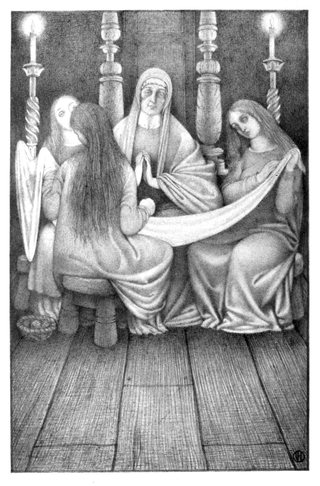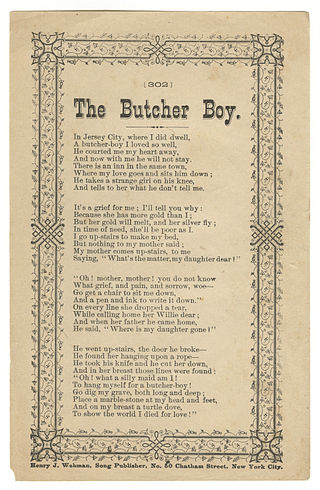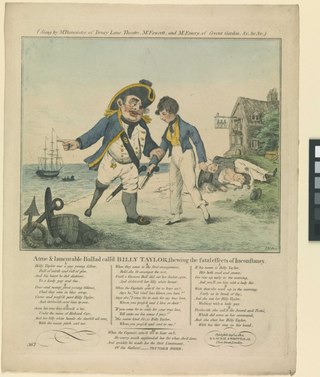Related Research Articles

"Lord Randall", or "Lord Randal", is an Anglo-Scottish border ballad consisting of dialogue between a young Lord and his mother. Similar ballads can be found across Europe in many languages, including Danish, German, Magyar, Irish, Swedish, and Wendish. Italian variants are usually titled "L'avvelenato" or "Il testamento dell'avvelenato", the earliest known version being a 1629 setting by Camillo il Bianchino, in Verona. Under the title "Croodlin Doo" Robert Chambers published a version in his "Scottish Ballads" (1829) page 324
"Mary Hamilton", or "The Fower Maries", is a common name for a well-known sixteenth-century ballad from Scotland based on an apparently fictional incident about a lady-in-waiting to a Queen of Scotland. It is Child Ballad 173 and Roud 79.

"The Raggle Taggle Gypsy" (Roud 1, Child 200), is a traditional folk song that originated as a Scottish border ballad, and has been popular throughout Britain, Ireland and North America. It concerns a rich lady who runs off to join the gypsies (or one gypsy). Common alternative names are "Gypsy Davy", "The Raggle Taggle Gypsies O", "The Gypsy Laddie(s)", "Black Jack David" (or "Davy") and "Seven Yellow Gypsies".
"Lady Isabel and the Elf Knight" is the English common name representative of a very large class of European ballads.
"Geordie" is an English language folk song concerning the trial of the eponymous hero whose lover pleads for his life. It is listed as Child ballad 209 and Number 90 in the Roud Folk Song Index. The ballad was traditionally sung across the English speaking world, particularly in England, Scotland and North America, and was performed with many different melodies and lyrics. In recent times, popular versions have been performed and recorded by numerous artists and groups in different languages, mostly inspired by Joan Baez's 1962 recording based on a traditional version from Somerset, England.

"Young Beichan", also known as "Lord Bateman", "Lord Bakeman", "Lord Baker", "Young Bicham" and "Young Bekie", is a traditional folk ballad categorised as Child ballad 53 and Roud 40. The earliest versions date from the late 18th century, but it is probably older, with clear parallels in ballads and folktales across Europe. The song was popular as a broadside ballad in the nineteenth century, and survived well into the twentieth century in the oral tradition in rural areas of most English speaking parts of the world, particularly in England, Scotland and Appalachia.

"Lord Thomas and Fair Annet", also known as "Lord Thomas and Fair Eleanor", is an English folk ballad.
"Fair Margaret and Sweet William" is a traditional English ballad which tells of two lovers, of whom either one or both die from heartbreak. Thomas Percy included it in his folio and said that it was quoted as early as 1611 in the Knight of the Burning Pestle. In the United States, variations of Fair Margaret have been regarded as folk song as early as 1823.
"Blacksmith", also known as "A Blacksmith Courted Me", is a traditional English folk song listed as number 816 in the Roud Folk Song Index.
The Suffolk Miracle is Child ballad 272 and is listed as #246 in the Roud Folk Song Index. Versions of the ballad have been collected from traditional singers in England, Ireland and North America. The song is also known as "The Holland Handkerchief" and sometimes as "The Lover's Ghost".
The Honest Labourer also known as The Jolly Thresher, Poor Man, Poor Man or The Nobleman and the Thresher is a traditional English Folk ballad, which tells the story of a meeting between a poor labourer and a wealthy noble.
"The Cuckoo" is a traditional English folk song, also sung in the United States, Canada, Scotland and Ireland. The song is known by many names, including "The Coo-Coo", "The Coo-Coo Bird", "The Cuckoo Bird", "The Cuckoo Is a Pretty Bird", "The Evening Meeting", "The Unconstant Lover", "Bunclody" and "Going to Georgia". Lyrics usually include the line : "The cuckoo is a pretty bird, she sings as she flies; she brings us glad tidings, and she tells us no lies."

Rosemary Lane"is an English folksong: a ballad that tells a story about the seduction of a domestic servant by a sailor. According to Roud and Bishop
"An extremely widespread song, in Britain and America. Its potential for bawdry means that it was popular in male-centred contexts such as rugby clubs, army barracks and particularly in the navy, where it can still be heard, but traditional versions were often collected from women as well as men."

"The Butcher’s Boy" or "The Butcher Boy" is an American folk song derived from traditional English ballads. Folklorists of the early 20th century considered it to be a conglomeration of several English broadside ballads, tracing its stanzas to "Sheffield Park", "The Squire's Daughter", "A Brisk Young Soldier", "A Brisk Young Sailor" and "Sweet William " and "Died for Love".
"One Morning in May" is an English folk song which has been collected from traditional singers in England and the USA and has also been recorded by revival singers. Through the use of double-entendre, at least in the English versions, it tells of an encounter between a grenadier and a lady.
"No, Sir, No" is an English folk song describing a courtship. It has been collected from traditional singers in England and the USA, and in a bowdlerised version was taught to English schoolchildren in music lessons in the 1950s. Alternative titles include "No, Sir", "No, John, No", "O No John", "Yes Or No", "Cruel Father", "Ripest Apples", "Twenty Eighteen", "The Spanish Merchant's Daughter", "The Spanish Captain", "Spanish Lady", "Yonder Sits a Spanish Lady", "Yonder Sits a Pretty Creature", and "In Yonder Grove".

"William Taylor" is a British folk song, often collected from traditional singers in England, less so in Scotland, Ireland, Canada and the USA. It tells the story of a young woman who adopts male dress and becomes a sailor in order to search for her lover. Other names include Billy Taylor, Brisk Young Seamen, Bold William Taylor, Down By the Seashore, The False Lover, The Female Lieutenant; Or, Faithless Lover Rewarded, If You'll Get Up Early in the Morning, The Life and Death of Billy Taylor, My Love, Poor William Taylor, Sally Brown and William Taylor, and Young Billy Taylor.
The Lark in the Morning is an English folk song. It was moderately popular with traditional singers in England, less so in Scotland, Ireland and the United States. It starts as a hymn to the ploughboy's life, and often goes on to recount a sexual encounter between a ploughboy and a maiden resulting in pregnancy.
The Golden Glove is an English folk song also popular in Scotland, Ireland and North America. It tells the tale of a young woman who falls in love with a farmer and devises a somewhat far-fetched ruse to win his love. This song is also known as Dog and Gun and The Squire of Tamworth
"Early, Early in the Spring" is a British folk song that has been collected from traditional singers in England, Scotland, Ireland, Canada and the United States. It tells the story of a sailor gone to sea whose beloved promises to wait for him. When he returns she has married a rich man and he goes back to sea with a broken heart and a bitter attitude. In a few American versions the betrayed lover is a cowboy.
References
- ↑ "VWML Online Laws P25". Library.efdss.org. Archived from the original on 2012-02-10. Retrieved 2012-06-17.
- ↑ English Folk Songs from the Southern Appalachians, Volume 1 Cecil J. Sharp Loomis House Press, Jun 1, 2012 ISBN 1935243179, 9781935243175
- ↑ "A Brisk Young Sailor". Contemplator.com. Retrieved 2012-06-17.
- ↑ "Traditional Ballad Index". Csufresno.edu. 2011-11-20. Retrieved 2012-06-17.
- ↑ "VWML Online Laws N42". Library.efdss.org. Archived from the original on 2012-02-10. Retrieved 2012-06-17.
- ↑ "VWML Online M22". Library.efdss.org. Archived from the original on 2012-02-10. Retrieved 2012-06-17.
- ↑ "Jolly Young Sailor Boy". Traditionalmusic.co.uk. Retrieved 2012-06-17.
- ↑ "WWML Online Roud 18830". Library.efdss.org. Archived from the original on 2012-02-10. Retrieved 2012-06-17.
- ↑ As printed in Axon Ballads No. 55: "Axon Ballads". Chethams.org.uk. Retrieved 2012-06-17.